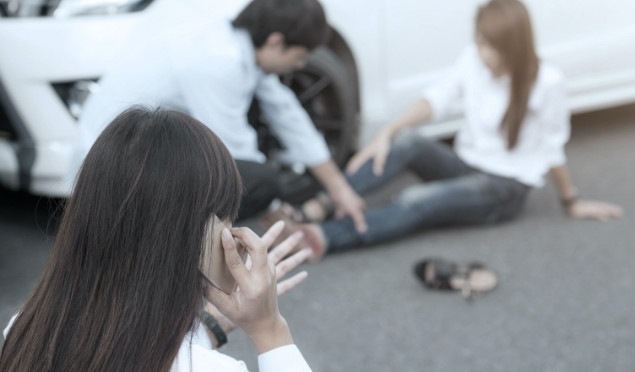What happens when you can’t afford an ambulance?

Published on 25th February, 2022 at 04:21 pm
If you’re straddling the line between life and death, no one would hesitate to call an ambulance for you. But what happens if you can’t afford to pay for it? We found out from experts in the South African private and public healthcare services.
The reality of South African roads
According to data from the International Transport Forum Road Safety Annual Report 2021, South Africa reported an estimated 12 503 road fatalities in 2019. To put that in context, as a nation, we have a troubling reputation for road-related deaths compared to our counterparts globally: according to World Health Organization’s Global Health Observatory Data Repository, 26 out of every 100 000 people in South Africa die on the roads – much higher than the global average of 18 per 100 000. This puts pressure on our healthcare services, with trauma unit and emergency service workers on the frontline.
No one wants to be in a position where they need the expertise of an emergency medical technician or trauma physician, but being prepared for a medical emergency is an important aspect of building financial confidence. Reality Access for Sanlam Group Risk members have access to an Emergency Medical Response benefit, a 24-hour telephonic advice and information service that provides emergency assistance until a medical team arrives at the scene. Read more about this benefit here.
According to data from the National Reference Price List for Ambulance Services (NRPLAS), the rates for ambulance transport have more than doubled. So, what can you expect to pay?
The cost of emergency care
Whether you collapse, are in a car accident, experience an epileptic fit or are otherwise incapacitated, you’ll need the help of a first responder. These are trained experts specialised in treating medical emergencies during the time before you reach the closest hospital or clinic for further care.
Private healthcare
“There are several factors that can affect the range of cost per callout,” says spokesperson for ER24, Russel Meiring. “These include distance travelled, level of care required (basic, intermediate or advanced), and distance travelled to the receiving facility.” Basic life support could be resuscitation, while more advanced life support can include a chest puncture to treat a collapsed lung.
Life support, ranging from basic to advanced, is gazetted at up to R4 300, with distance travelled being billed at between around R32/km and R54/km, depending on the level of treatment required.
Then, resuscitation can cost around R5 000 per incident, and around R1 500/hour charged for a doctor’s callout.
Public healthcare
“There are fixed Uniform Patient Fee Schedule (UPFS) tariffs as determined by the medical aid and board of healthcare funders, and these are largely predetermined,” says Deanna February, spokesperson for the Western Cape Government Emergency Medical Services (EMS). In 2022, you’re looking at a cost of R461 (up to 100km) for the use of an ambulance vehicle, with life support ranging between R1 250 and R2 800 depending on how invasive the required treatment is.
To have an emergency service professional on standby can set you back between R192 and R1 100, also depending on how invasive the treatment needed, and a facility fee comes at a flat fee of around R600.
What about a rescue? Costs go up quite substantially for this. If a specialist medical practitioner is required, you’re looking at around R3 000 per incident. And if air transport is needed, you’d be billed at around R14 000 per flying hour.
Not knowing how to handle a medical emergency can add to the stress of dealing with it while waiting for expert help to arrive. Here are five common emergencies and how to manage them.
What if you can’t pay?
Looking at our spending and saving behaviour as a nation, we don’t save enough. It’s understandable, then, that the last thing we think about when it comes to planning for an emergency is the cost of an ambulance and paramedic. Plenty of South Africans are caught in this uncomfortable position when faced with a life-or-death scenario.
Don’t stress! “[In public healthcare] fees are not a prerequisite for care,” says February. “Payment is handled after the service is delivered, and there are processes in place to help clients who are unable to pay. In short: service is rendered irrespective of a client’s ability to pay.”
If you are the member of a medical aid scheme, your ambulance expense would be covered by your plan. If not, the account needs to be settled by you. “We do inform the caller that there will be a bill,” says Meiring.
Refusing help
Even though you can receive care without being able to pay for it, you aren’t obliged to accept it. “You can refuse treatment, but acceptance of this is based on your own state of mind and competency,” says February. “However, we don’t determine affordability or insurance status before determining to transport a client or not.”
Meiring adds that you are required to sign a refusal of treatment form for legal purposes if you don’t want to accept professional care.
If you are unconscious, this is treated as implied consent.
As a Reality Health, Plus, Core, Club or Access for Sanlam Group Risk member, you can access 24-hour medical assistance and counselling telephonically by calling 0860 732 548/9, for free. Receive help in a situation where assault, accidental exposure to HIV or any other trauma has occurred. Learn more here.
Want to learn more?
We send out regular emails packed with useful advice, ideas and tips on everything from saving and investing to budgeting and tax. If you're a Sanlam Reality member and not receiving these emails, update your contact details now.
Update Now







